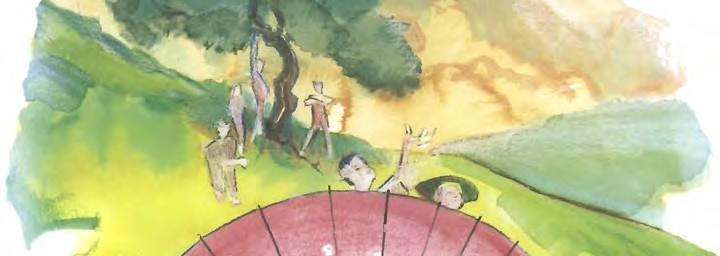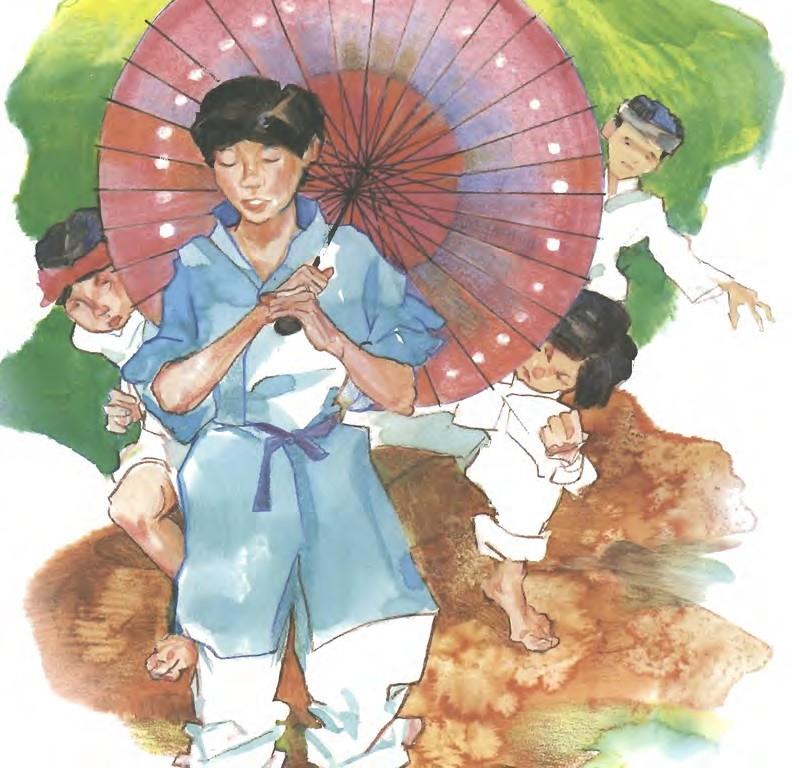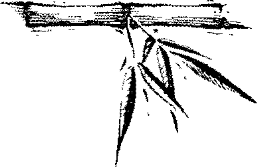Chapter 2
A GREAT MASTER OF KARATE
He opened his umbrella quickly and held it over the back of his head as a defense from any blows that might come from behind.
The following short story really happened in Gichin Funakoshi's life when he was a young man. Explained in his own book, Karate-Do, My Way of Life, it is retold here to make one very important point: that Karate is not a way to defeat an opponent but a way to overcome the enemy without fighting.
This may surprise you, for on the surface it looks like Karate is a violent practice. The real Karate student or teacher knows that Karate is actually a way to gentleness and nonviolence.
The following story of Funakoshi, a great teacher, who truly lived the Art of Karate, illustrates this point.
The Danger of Pride
Funakoshi was just 13 years old when he walked down a long and lonely road on his way to a neighboring town. On his journey he came upon a group of young people on a grassy hill-side who were in the midst of an exciting and challenging game of hand wrestling.
Since Funakoshi was quite fond of this sport, and felt confident in it, he stopped and watched for a time. Suddenly one of the young boys called to Funakoshi, "Hey, you! Come on and try 18








to beat us! But maybe you're afraid to take one of us on?" Another of the youths called to him and challenged him again.
Since Funakoshi didn't want to cause trouble he said,
"Thank you, no; excuse me, but I have to go." He started down the path.
"Hey, you can't go!" A few of the boys ran up to the young Funakoshi.
"Scared? Running away?" jeered one of the group.
"Come on, kid, that's not polite to leave," said another.
Two of the boys grabbed Funakoshi's shirt and dragged him back to where the remaining boys were waiting. Funakoshi realized that, after having studied Karate for the last two years, he could have used his skills and made a fast escape, but instead he decided to try his hand at the contest. His first bout, with the weakest and youngest of the group, he won easily. His second opponent he also defeated with ease. He went on to win the next three challenges. Now there were only two left, and they both looked strong.
"All right," said one of the strong, large boys, "it's my turn now. You won't get away so easily. Are you ready to take me on?"
Funakoshi looked at these last two large boys. "I'm afraid I'm not; I've had enough, and I'm sure I can't beat you anyway."
He excused himself. But the young boys blocked his way. One of the two boys grabbed his hand so Funakoshi had to take him on. Funakoshi won again. "Now I really must leave," he said.
"Thank you." And he excused himself again.
This time they let him go, but as he began walking down the road away from the group he heard sounds behind him.
That morning when Funakoshi had left home he had taken his 20

umbrella with him as it had been raining. Now that the rain had stopped he was using the umbrella as a walking stick. He opened it quickly and held it over the back of his head as a defense from any blows that might come from behind.
As he reached his destination, Funakoshi was filled with regret and sorrow. He was ashamed that he had let himself enter that hand-wrestling competition. He wondered why he had done so. "Was it mere curiosity?" he asked himself. But the true answer came to him: It was his over-confidence in his strength , in his ability to defeat those other boys at a game he felt good at. It was, in other words, his pride. He felt he had let his Karate teachers down and violated the spirit of the Art of Karate.
As he told this story almost 75 years later, he still felt deeply ashamed, because the great teacher truly believed:
"To subdue the enemy without fighting is the highest skill."












